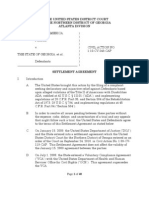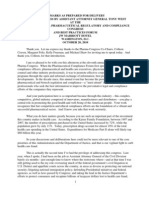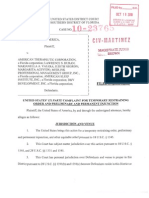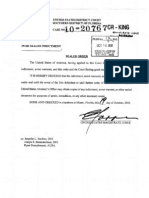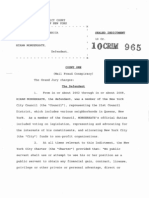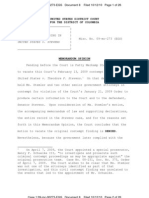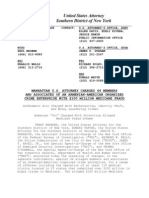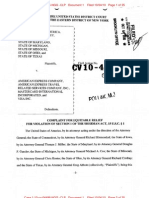Professional Documents
Culture Documents
DOJ Bingo Probe - Pouncy Plea Agreement
Uploaded by
MainJustice0 ratings0% found this document useful (0 votes)
290 views19 pagesPleaded guilty to conspiracy to Commit Bribery in Programs Receiving Federal Funds. If the defendant fulfills each of the terms and conditions of this agreement, the u.s. Will not further prosecute the defendant. Nothing in this agreement is intended to provide any limitation of liability arising out of any acts of violence.
Original Description:
Copyright
© Attribution Non-Commercial (BY-NC)
Available Formats
PDF or read online from Scribd
Share this document
Did you find this document useful?
Is this content inappropriate?
Report this DocumentPleaded guilty to conspiracy to Commit Bribery in Programs Receiving Federal Funds. If the defendant fulfills each of the terms and conditions of this agreement, the u.s. Will not further prosecute the defendant. Nothing in this agreement is intended to provide any limitation of liability arising out of any acts of violence.
Copyright:
Attribution Non-Commercial (BY-NC)
Available Formats
Download as PDF or read online from Scribd
0 ratings0% found this document useful (0 votes)
290 views19 pagesDOJ Bingo Probe - Pouncy Plea Agreement
Uploaded by
MainJusticePleaded guilty to conspiracy to Commit Bribery in Programs Receiving Federal Funds. If the defendant fulfills each of the terms and conditions of this agreement, the u.s. Will not further prosecute the defendant. Nothing in this agreement is intended to provide any limitation of liability arising out of any acts of violence.
Copyright:
Attribution Non-Commercial (BY-NC)
Available Formats
Download as PDF or read online from Scribd
You are on page 1of 19
UNITED STATES DISTRICT COURT
MIDDLE DISTRICT OF ALABAMA.
UNITED STATES OF AMERICA. ) Criminal Number:
)
vs. )
)
JENNIFER D. POUNCY, )
)
——_—_—Daiendant____J
PLEA AGREEMENT
‘The United States of America, by and through the undersigned attomeys for the Public
Integrity Section, Criminal Division, United States Department of Justice, and Jennifer
Dougherty Pouncy (hereinafter referred 1o as the “defendant”) enter into the following
agreement:
Charges and Statutory Penalties
1. The defendant agrees to waive indictment and plead guilty to Count I of the
attached Information, which charges Conspiracy to Commit Bribery in Programs Receiving
Federal Funds, in violation of Title 18, United States Code, Section 371
2. ‘The defendant understands that Count I has the following essential elements, each
of which the United States would be required to prove beyond a reasonable doubt at tral:
a. First, the defendant entered into an agreement to commit a federal crime;
b. Second, the defendant intentionally joined in the agreement; and
©. Third, one of the persons involved in the conspiracy committed an overt act in
furtherance of the agreement.
ks ‘The defendant understands that pursuant to 18 U.S.C. §§ 371, 3583, and
1
3571(b)(3), Count One carries a maximum sentence of five (5) years of imprisonment, a fine of
$250,000, and term of supervised release not more than three (3) years. The defendant also
understands that she is subject to a $100 special assessment, an order of restitution, and an
obligation to pay any applicable interest or penalties on fines or restitution not timely made,
4, If the Court accepts the defendant’s plea of guilty and the defendant fulfills each
of the terms and conditions of this agreement, the United States agrees that it will not further
prosecute the defendant for any crimes described in the factual basis below or for any conduct of
the defendant now known to the Public Integrity Section and to the law enforcement agents
‘working with the Public Integrity Section on the present investigation. Nothing in this agreement
is intended to provide any limitation of liability arising out of any acts of violence.
Factual Stipulations
5. Some time in or around April 2006 until some time in or around May 2010,
the defendant was employed as a registered lobbyist by a lobbying firm located in Montgomery
Alabama, which was headed by Lobbyist 1.
6. Lobbyist 1°s largest client was Businessman 1. Businessman 1 owned a
controlling interest in an entertainment development project in Houston County, Alabama, which
‘was an entertainment and resort venue that offered live country-music performances, upscale
hotel accommodations, and casino-style electronic bingo machines.
Businessman 2 has the controlling interest in an upscale hotel that offers
entertainment, dog racing, and casino-style electronic bingo in Macon County, Alabama.
Businessman 2 also shares an ownership interest in Businessman 1s entertainment and resort
venue,
8. In 2009, gambling supporters in the State of Alabama formed a coalition to
promote the passage of pro-gambling legislation favorable to the interests of businessmen
= such as Businessmen 1 and 2 - who owned and operated facilities that offered electronic
bingo. Although the pro-gambling legislation was drafted, it was not put to a vote by the
Alabama legislature during its 2009 session. At the commencement of the Alabama legislature's
2010 session, various members of the Alabama Senate and House of Representatives introduced
legislation that, if enacted, would have promoted the business interests of electronic-bingo
facility owners and operators. Among that proposed legislation was Senate Bill 380.
9. Businessmen 1 and 2 sought to influence the passage of Senate Bill 380 by buying
the votes of Alabama legislators. Specifically, some time in or around January 2009 until some
time in or around April 2010, Businessman 1 employed Lobbyist 1 and his lobbying firm to
bribe Alabama legislators with money and other things of value in exchange for votes in favor of
the passage of Senate Bill 380. Lobbyist 1 and Businessman 1 acted in concert with
Businessman 2 as part of this conspiracy. The defendant acted under the direction of and was
supervised by Lobbyist 1 and Businessman 1 as part of these efforts to offer bribes to Alabama
legislators in exchange for their votes in favor of Senate Bill 380. Furthermore, the defendant
‘knew that Businessman 2 employed Lobbyist 2. Lobbyist 1 told the defendant that Lobbyist 2
had communicated offers of things of value to legislators in exchange for pro-gambling votes.
10. In or around the first week of March 2010, as instructed by Lobbyist 1 and
Businessman 1, the defendant met with Senator 1, an Alabama state senator, at his Senate office
to discuss Senate Bill 380. Senator 1 told the defendant that if the vote on Senate Bill 380 were
held at that time, Senator 1 would vote against it.
11, The defendant immediately reported her conversation with Senator 1 to Lobbyist
1, and Lobbyist 1 then instructed the defendant to tell Senator 1 that if he voted in favor of
Senate Bill 380, Lobbyist 1 and Businessman 1 would give him $2,000,000 for his 2010
reelection campaign. Having received her instructions from Lobbyist 1, the defendant met with
Senator 1 in his legislative office in Montgomery and told him that Lobbyist 1 and Businessman
1 would provide him with $2,000,000 for his 2010 reelection campaign if he voted in favor of
Senate Bill 380.
12. On or about March 1, 2010, through March 31, 2010, Lobbyist 1 informed the
defendant that he and Businessman | had both spoken with Senator |. Lobbyist 1 told the
defendant that in addition to the $2,000,000 contribution, in order to buy Senator 1°s support for
Senate Bill 380, Lobbyist 1 and Businessman | had also offered Senator 1 the following: (1) to
perform election polling for Senator 1; (2) to buy one hundred (100) Ford vehicles worth about
$1,000,000 from an automobile dealership owned by Senator 1 for Businessman 1's
entertainment business in Houston County, Alabama; and (3) to have country music entertainers
help in Senator I's reelection campaign.
13, Lobbyist | told the defendant that Lobbyist 2 had asked him what commitment
had been made to Senator | in exchange for Senator I's vote in support of Senate Bill 380.
14, On or about March 24, 2010, Senator 1 approached the defendant at the Alabama
Senate and asked her if the commitments made to him by Businessman 1 and Lobbyist 1 would
still be honored if Senate Bill 380 passed the Senate but did not pass the Alabama House of
Representatives. The defendant told Lobbyist 1 about Senator 1’s question and Lobbyist 1 told
her to relay to Senator 1 that the commitments, i.e, the money, vehicle purchases, election
polling, and musical entertainment, would be honored whether or not Senate Bill 380 passed the
4
House. The defendant told Senator 1 that the commitments would be honored. Based on her
interactions with Lobbyist 1, Businessman 1, and Senator 1, the defendant understood that the
above commitments made to Senator 1 were offered with the clear understanding that they were
in exchange for Senator 1's support for Senate Bill 380.
1s. ‘On or about March 30, 2010, Senator 1 told the defendant in the Senate hallway
that he was going to support Senate Bill 380.
16. On or about March 30, 2010, Senator 1 voted in favor of Senate Bill 380.
17. On or about March 30, 2010, Lobbyist | informed the defendant that Senator 1
had spoken with Businessman 1 by telephone and had confirmed that Senator | and Businessman
1 had an understanding that as a result of Senator I's support for Senate Bill 380, Businessman 1
‘would honor his commitments to Senator 1.
18. On or about March 24, 2010, Senator 2 approached the defendant while she was
at the Alabama Senate and asked the defendant to ask Businessman 1 and Lobbyist 1 if they
would contribute $100,000 to his campaign. It was clear to the defendant Senator 2 was
requesting the money in exchange for his vote in favor of Senate Bill 380.
19, The defendant told Lobbyist 1 of Senator 2’s request for $100,000 in exchange for
his vote, and Lobbyist | informed the defendant that he had called Businessman 1 and had told
him that Senator 2 was “shaking them down” for $100,000. Following this conversation,
Lobbyist | instructed the defendant to tell Senator 2 that Businessman | and Lobbyist 1 would
make the contribution,
20. On or about March 24, 2010, the defendant approached Senator 2 at his Senate
office and told him that Lobbyist 1 and Businessman 1 would make the $100,000 contribution.
‘Senator 2 asked the defendant if “they were talking about the same thing,” and she replied “yes.”
5
‘The defendant understood that Senator 2 was being bribed so that he would support Senate Bill
380,
21. Onor about March 30, 2010, Senator 2 voted in support of Senate Bill 380.
22, The defendant was also told by Lobbyist I that Senator 3, an Alabama state
senator, desired and had been guaranteed money from Lobbyist 1 and Businessman 1 in
exchange for Senator 3's support for Senate Bill 380.
23, Some time before the end of 2009 or at the beginning of 2010, Senator 3 called
the defendant at Lobbyist 1’s lobbying firm. During the call, Senator 3 told the defendant that he
wanted a campaign contribution from Lobbyist | and Businessman 1. Senator 3 was very direct
and demanded either $5,000 or $10,000. During the call, Senator 3 told the defendant that he
believed that he deserved the campaign contribution because he had sponsored the pro-gambling
legislation in the 2009 legislative session, and that he was no longer “feeling the love.” It was
clear to the defendant that Senator 3 was demanding the money to ensure his continued support
for pro-gambling legislation. The contributions were made as demanded.
24, Lobbyist 1 told the defendant that he had received requests for money from
Senator 3 in 2010. Indeed, a week or two prior to the March 30, 2010, vote in the Alabama
Senate regarding the passage of Senate Bill 380, Senator 3 called Lobbyist 1 and asked for
$25,000. The defendant considered the demands for money from Senator 3 to have been made
with the clear intent to convey that he deserved the money as a reward for supporting Senate Bill
380, and that if he did not get the money, he would no longer support Senate Bill 380.
25. Defendant discussed Senator 3's demands with Lobbyist 2, who worked for
Businessman 2, and Lobbyist 2 told the defendant that Senator 3 had already received at least
$15,000 from Lobbyist 2 and was demanding even more money.
6
26. ‘The defendant agrees that the above “Factual Stipulations” fairly and
accurately describe the defendant's actions and involvement in the offenses to which the
defendant is pleading guilty. The defendant knowingly, voluntarily and truthfully admits the
facts set forth in the Factual Basis for Plea.
Sentencing
27. — The defendant is aware that the sentence will be imposed by the court afler
considering the Federal Sentencing Guidelines and Policy Statements (hereinafter “Sentencing
Guidelines”). The defendant acknowledges and understands that the court will compute an
advisory sentence under the Sentencing Guidelines and that the applicable guidelines will be
determined by the court relying in part on the results of a Pre-Sentence Investigation by the
court's probation office, which investigation will commence after the guilty plea has been
entered. The defendant is also aware that, under certain circumstances, the court may depart
from the advisory sentencing guideline range that it has computed, and may raise that advisory
‘sentence up to and including the statutory maximum sentence or lower that advisory sentence.
‘The defendant is further aware and understands that the court is required to consider the advisory
guideline range determined under the Sentencing Guidelines, but is not bound to impose that
‘sentence; the court is permitted to tailor the ultimate sentence in light of other statutory concerns,
and such sentence may be either mote severe or less severe than the Sentencing Guidelines’
advisory sentence. Knowing these facts, the defendant understands and acknowledges that the
court has the authority to impose any sentence within and up to the statutory maximum
authorized by law for the offense identified in paragraph 1 and that the defendant may not
withdraw the plea solely as a result of the sentence imposed.
28. The United States reserves the right to inform the court and the probation office of
7
all facts pertinent to the sentencing process, including all relevant information concerning the
offenses committed, whether charged or not, as well as conceming the defendant and the
defendant's background. Subject only to the express terms of any agreed-upon sentencing
recommendations contained in this agreement, the United States further reserves the right to
make any recommendation as to the quality and quantity of punishment.
29. The defendant is aware that any estimate of the probable sentence or the probable
sentencing range relating to the defendant pursuant to the advisory Sentencing Guidelines that
the defendant may have received from any source is only a prediction and not a promise, and is
not binding on the United States, the probation office, or the court, except as expressly provided
in this plea agreement.
Sentencing Gr ‘lines Stipulations
30. — The defendant understands that the sentence in this case will be determined by the
Court, pursuant to the factors set forth in 18 U.S.C. § 3553(a), including a consideration of the
guidelines and policics promulgated by the United States Sentencing Commission, Guidelines
Manual - 2009 Edition (hereinafter “Sentencing Guidelines” or “U.S.S.G"). Pursuant to Federal
Rule of Criminal Procedure 11(c)(1)(B), and to assist the Court in determining the appropriate
sentence, the parties stipulate to the following:
a Off idelines
‘The parties agree that the Sentencing Guidelines applicable to Count One, to which the
defendant is pleading guilty, is § 2C1.1, which applies to, among other things, “Offering, Giving,
Soliciting, or Receiving a Bribe.” The parties further stipulate and agree to recommend the
following guideline calculations:
2C1.1(@)(1) Base Offense Level...
2C1.1(6X1) More Than One Bribe...
2C1.1(b)(2) and § 2B1.1(b)(J) Value of Amount Offered Between
$1,000,000 And $2,500,000...
2C1.1(6(3) Payment Was for Purpose of Influencing an Official Act of
an Elected Official..
b Acceptance of Responsibility
Provided that the defendant clearly demonstrates acceptance of responsibility, to the
satisfaction of the United States, through the defendant's allocution and subsequent conduct prior
to the imposition of sentence, the United States agrees that a 2-level reduction would be
appropriate, pursuant to U.S.S.G § 3E}.1(@).
‘The United States, however, may oppose any adjustment for acceptance of responsibility
if the defendant:
iv.
fails to admit a complete factual basis for the plea at the time the
defendant is sentenced or at any other time;
challenges the adequacy or sufficiency of the United States’ offer
of proof at any time after the plea is entered;
denies involvement in the offense;
gives conflicting statements about that involvement or is untruthful
with the Court, the United States or the Probation Office;
fails to give complete and accurate information about the
defendant's financial status to the Probation Office;
obstructs or attempts to obstruct justice, prior to sentencing;
9
vii, has engaged in conduct prior to signing this Plea Agreement which
reasonably could be viewed as obstruction or an attempt to obstruct
justice, and has failed to fully disclose such conduct to the United
‘States prior to signing this Plea Agreement;
fails to appear in court as required;
ix. afer signing this Plea Agreement, engages in additional criminal
conduct; of
x. attempts to withdraw the plea of guilty
If the defendant has accepted responsibility as described above, and the defendant's
offense level is sixteen or greater, the United States agrees that an additional 1-level reduction
would be appropriate, pursuant to § 3EI.1(b), U.S.S.G., because the defendant has assisted
authorities by providing timely notice of the defendant's intention to enter a plea of guilty,
thereby permitting the United States to avoid preparing for trial and permitting the Court to
allocate its resources efficiently.
In accordance with the above, the applicable Guidelines Offense Level is 31
Criminal History c
Based upon the information now available to the United States (including
representations by the defense), the defendant has no prior criminal convictions.
In accordance with the above, the defendant's Criminal History Category is one (1).
4. Applicable Guideline Range
Based on the calculations set forth above, the Guidelines range is one-hundred and eight
(108) to one-hundred and thirty-five (135) months. Because the statutory maximum sentence is
60 months, the defendant's stipulated Guidelines range (the “Stipulated Guidelines Range”) is 60
10
months. In addition, the parties agree that should the Court impose a fine, al Guidelines level
thirty-one (31), the applicable fine range is $15,000 to 150,000.
The parties agree that under the Sentencing Guidelines neither a downward nor an
upward departure from the Stipulated Guidelines Range set forth above is warranted.
Accordingly, neither party will seek such a departure or seck any adjustment not set forth herein.
Nor will either party suggest that the Court consider such a departure or adjustment, absent any
future unforeseen circumstances.
Agreement as to Sentencing Allocution
31. Nothing in this Agreement limits the right of the parties to make any arguments
regarding the appropriate sentence for the defendant,
wurt Not Bound b lea Agreement
32. Itis understood that pursuant to Federal Rules of Criminal Procedure 11(e)(1)(B)
and 11(¢)(3)(B) the Court is not bound by the above stipulations, either as to questions of fact or
1s to the parties’ determination of the applicable Guidelines range, ot other sentencing issues. In
the event that the Court considers any Guidelines adjustments, departures, or calculations
different from any stipulations contained in this Agreement, or contemplates a sentence outside
the Guidelines range based upon the general sentencing factors listed in Title 18, United States
Code, Section 3553(a), the parties reserve the right to answer any related inquiries from the
Court
Substantial Assi
33. The defendant agrees to cooperate fully with the United States by:
providing truthful and complete information and testimony, and producing,
documents, records, and other evidence, when called upon by the United
ir
States, whether in interviews, before a grand jury, or at any trial or other
court proceeding;
waiving the defendant’s right to have counsel present at all debriefings by
law enforcement agents and government attorneys in order to facilitate the
defendant's cooperation. The defendant may revoke this waiver at any
time by a specific request or through defendant's counsel without affecting
the terms and enforceability of this Plea Agreement,
appearing at such grand jury proceedings, hearings, trials, depositions, and
other judicial proceedings, and at meetings, as may be required by the
United States continuing through any period of probation or supervised
release;
if requested by the United States, working in an undercover role to contact
and negotiate with others suspected and believed to be involved in
criminal misconduct under the supervision of, and in compliance with, law
enforcement officers and agents; and
waiving any right to a prompt sentencing and joining in any requests by
the United States to postpone the defendant’s sentencing until the
defendant’s cooperation is complete. ‘The defendant understands that the
date of sentencing is within the sole discretion of the Court, and that this
agreement may require the defendant to cooperate even after the defendant
hhas been sentenced. The defendant's failure to cooperate pursuant to the
terms of this Plea Agreement after sentence has been imposed shall
constitute a breach of this Plea Agreement.
12
34. The United States reserves the right to evaluate the nature and extent of the
defendant's cooperation and to make the defendant's cooperation, or lack thereof, known to the
Court at sentencing. If in the sole and unreviewable judgment of the United States the
defendant’s cooperation is of such quality and significance to the investigation or prosecution of
other criminal matters as to warrant the court's downward departure from the advisory sentence
calculated under the Sentencing Guidelines, the United States may at or before the sentencing
make a motion consistent with the intent of U.S.S.G. § SKI.1 prior to sentencing, or Rule 35 of
the Federal Rules of Criminal Procedure subsequent to sentencing, reflecting that the defendant
has provided substantial assistance and recommending that the defendant's sentence be reduced
from the advisory sentence suggested by the Sentencing Guidelines. The defendant
acknowledges and agrees, however, that nothing in this Plea Agreement may be construed to
require the United States to file any such motion(s) and that the United States’ assessment of the
nature, value, truthfulness, completeness, and accuracy of the defendant's cooperation shall be
binding insofar as the appropriateness of the United States’ filing of any such motion is
concemed,
35. The defendant understands and acknowledges that the Court is under no
obligation to grant the Section SKI.1 or Rule 35 motions referenced above should the
‘government exercise its discretion to file any such motion. The defendant also understands and
acknowledges that the Court is under no obligation to reduce the defendant's sentence because of
the defendant's cooperation.
36. Pursuant to U.S.S.G. § 1B1.8(a), the United States agrees that self-incriminating
information provided by the defendant pursuant to this agreement to cooperate will not be used
1B
in determining the applicable Sentencing Guidelines range, except as may be provided in this
Plea Agreement and under U.S.S.G. § 1B1.8(b).
Appeal Waiver
37, The defendant is aware that the defendant has the right to challenge the
defendant's sentence and guilty plea on direct appeal. The defendant is also aware that the
defendant may, in some circumstances, be able to argue that the defendant's guilty plea should
be set aside, or sentence set aside or reduced, in a collateral challenge (such as pursuant to a
‘motion under 28 U.S.C, § 2255). Knowing that, and in consideration of the concessions made by
the United States in this Agreement, the defendant knowingly and voluntarily waives her right to
appeal or collaterally challenge: (@) the defendant's guilty plea and any other aspect of the
defendant's conviction, including, but not limited to, any rulings on pretrial suppression motions
or any other pretrial dispositions of motions and issues; and (b) the defendant's sentence or the
‘manner in which her sentence was determined pursuant to 18 U.S.C. § 3742, except to the extent
‘that the Court sentences the defendant to a period of imprisonment longer than the statutory
‘maximum, or the Court departs upward from the applicable Sentencing Guideline range pursuant
to the provisions of U.S.S.G. § SK.2 or based on a consideration of the sentencing factors set
forth in 18 U.S.C. § 3553(a).
38, The defendant further understands that nothing in this agreement shall affect
Public Integrity’s right and/or duty to appeal as set forth in Title 18, United States Code, Section
3742(b), However, if the United States appeals the defendant’s sentence pursuant to Section
3742(b), the defendant shall be released from the above waiver of appellate rights. By signing
this agreement, the defendant acknowledges that the defendant has discussed the appeal waiver
set forth in this agreement with the defendant’s attomey. The defendant further agrees, together
14
with the United States, to request that the district court enter a specific finding that the waiver of
‘the defendant's right to appeal the sentence to be imposed in this case was knowing and
voluntary.
39. The defendant’s waiver of rights to appeal and to bring collateral challenges shall
not apply {o appeals or challenges based on new legal principles in the Eleventh Circuit or
Supreme Court cases decided after the dete of this Agreement that are held by the Eleventh
Circuit or Supreme Court to have retroactive effect.
Restitution
40. _ Inaddition to the other penalties provided by law, the Court may also order
the defendant to make restitution under 18 U.S.C. § 3663.
Release/Detention
41. The defendant acknowledges that while the United States will not seek a change
in the defendant's release conditions pending sentencing, the final decision regarding the
defendant's bond status or detention will be made by the Court at the time of the defendant's
plea of guilty. Should the defendant engage in further criminal conduct or violate any conditions
‘of release prior to sentencing, however, the United States may move to change the defendant's
conditions of release or move to revoke the defendant’s release.
Breach of Agreement
42. The defendant understands and agrees that if, after entering this Plea Agreement,
the defendant fails specifically to perform or to fulfill completely each and every one of the
defendant's obligations under this Plea Agreement, or engages in any criminal activity prior to
sentencing, the defendant will have breached this Plea Agreement. In the event of such a breach:
15
(a) the United States will be free from its obligations under the Agreement; (b) the defendant will
not have the sight to withdraw the guilty plea; (c) the defendant shall be fully subject to criminal
prosecution for any other crimes, including perjury and obstruction of justice; and (d) the United
States will be free to use against the defendant, directly and indirectly, in any criminal or civil
proceeding, all statements made by the defendant and any of the information or materials
provided by the defendant, including such statements, information and materials provided
pursuant to this Agreement or during the course of any debriefings conducted in anticipation of,
or after entry of this Agreement, including the defendant's statements made during proceedings,
before the Court pursuant to Fed. R. Crim. P. 11.
43, The defendant understands that Federal Rule of Criminal Procedure 11(f) and
Federal Rule of Evidence 410 ordinarily limit the admissibility of statements made by a
defendant in the course of plea discussions or plea proceedings if a guilty plea is later withdrawn.
‘The defendant knowingly and voluntarily waives the rights which arise under these rules.
44. The defendant understands and agrees that the United States shall only be
required to prove a breach of this Plea Agreement by a preponderance of the evidence. The
defendant further understands and agrees that the United States need only prove a violation of
federal, state, or local criminal law by probable cause in order to establish a breach of this Plea
Agreement.
45. Nothing in this Agreement shall be construed to permit the defendant to commit
perjury, to make false statements or declarations, to obstruct justice, or to protect the defendant
from prosecution for any crimes not included within this Agreement or committed by the
defendant after the execution of this Agreement. The defendant understands and agrees that the
United States reserves the right to prosecute the defendant for any such offenses. The defendant
16
further understands that any perjury, false statements or declarations, or obstruction of justice
relating to the defendant's obligations under this Agreement shall constitute a breach of this
Agreement. However, in the event of such a breach, the defendant will not be allowed to
‘withdraw this guilty plea.
ws ite of Li
tio
46. Its further agreed that should any conviction following the defendant's plea of
guilty pursuant to this Agreement be vacated for any reason, then any prosecution that is not
time-barred by the applicable statute of limitations on the date of the signing of this Agreement
(including any counts that the United States has agreed not to prosecute or to dismiss at
sentencing pursuant to this Agreement) may be commenced or reinstated against the defendant,
notwithstanding the expiration of the statute of limitations between the signing of this Agreement
and the commencement or reinstatement of such prosecution. It is the intent of this Agreement
to waive all defenses based on the statute of limitations with respect to any prosecution that is,
not time-barred on the date that this Agreement is signed.
Complete Agreement
47, No other agreements, promises, understandings, or representations have been
made by the parties or their counsel than those contained in writing herein, nor will any such
agreements, promises, understandings, or representations be made unless committed to writing
and signed by the defendant, defense counsel, and a prosecutor for the Public Integrity Section.
48, The defendant further understands that this Agreement is binding only upon the
Public Integrity Section, Criminal Division, United States Department of Justice. This
‘Agreement does not bind the Civil Division or any other United States Attomey’s Office, nor
17
does it bind any other state, local, or federal prosecutor. It also does not bar or compromise any
civil, tax, or administrative claim pending or that may be made against the defendant.
49. If the foregoing terms and conditions are satisfactory, the defendant may 50
Indicate by signing the Agreement in the space indicated below and returning the original to me
once it has been signed by the defendant and by you or other defense eounse}.
FOR THE UNITED STATES
Chief
Public Integrity Section
1400 New York Ave. NW
Washington, DC 20005
(202) 514-1412
18
DEFENDANT'S ACCEPTANCE
[have read this agreement in its entirety and discussed it with my attorney. I hereby
acknowledge that it fully sets forth my agreement with the United States. | further state that no
additional promises or representations have been made to me by any official of the United
States in connection with this matter. I understand the crimes to which I have agreed to plead
guilty, the maximum penalties for those offenses and Sentencing Guideline penalties potentially
applicable to them. 1 am satisfied with the legal representation provided to me by my attomey.
We have had sufficient time to meet and discuss my case. We have discussed the charges
‘against me, possible defenses I might have, the terms of this Plea Agreement and whether 1
‘should go to trial. 1 am entering into this Agreement freely, voluntarily, and knowingly because
1am guilty of the offenses to which I am pleading guilty, and I believe this Agreement is in my
best interest.
Date: 4 ~ 14- 26/0
fer D. founcy
jefendan}
TTORNEY’ )WLEDGMENT
Ihave read each of the pages constituting this Plea Agreement, reviewed them with my
client, and discussed the provisions of the Agreement with my client, fully. These pages
accurately and completely sets forth the entire Plea Agreement. 1 concur in my client's desire to
plead guilty as set forth in this Agreement.
at SGn G mew | plans
owe 24 Lore mn
Thoms J. Spina
James 8. Ward
‘Attorneys for the Defendant
oe
You might also like
- Hate Crimes Prosecutions - Federal RegisterDocument4 pagesHate Crimes Prosecutions - Federal RegisterMainJusticeNo ratings yet
- Georgia-DOJ ADA Settlement Agreement (Signed) 2010.10.19Document41 pagesGeorgia-DOJ ADA Settlement Agreement (Signed) 2010.10.19MainJusticeNo ratings yet
- G80RTY7SDocument9 pagesG80RTY7SMainJusticeNo ratings yet
- Carl Shapiro Remarks at ABA Antitrust ConferenceDocument35 pagesCarl Shapiro Remarks at ABA Antitrust ConferenceMainJusticeNo ratings yet
- Perez Remarks On Georgia ADA SettlementDocument2 pagesPerez Remarks On Georgia ADA SettlementMainJusticeNo ratings yet
- Chesser InformationDocument19 pagesChesser InformationMainJusticeNo ratings yet
- West - ATC Press Conference - 10-21-10Document2 pagesWest - ATC Press Conference - 10-21-10MainJusticeNo ratings yet
- The Future of White Collar Enforcement-Prepared RemarksDocument10 pagesThe Future of White Collar Enforcement-Prepared RemarksMainJusticeNo ratings yet
- Breuer - ATC Press Conference - 10-21-10Document2 pagesBreuer - ATC Press Conference - 10-21-10MainJusticeNo ratings yet
- Remarks by AAG Tony West To Pharma CongressDocument5 pagesRemarks by AAG Tony West To Pharma CongressMainJusticeNo ratings yet
- TRO-ATC Et AlDocument8 pagesTRO-ATC Et AlMainJusticeNo ratings yet
- Amicus Brief by Former AGs in Health Care LawsuitDocument37 pagesAmicus Brief by Former AGs in Health Care LawsuitMainJusticeNo ratings yet
- United States Complaint For TRO - ATCDocument28 pagesUnited States Complaint For TRO - ATCMainJusticeNo ratings yet
- 101021-01 IndictmentDocument19 pages101021-01 IndictmentGovtfraudlawyerNo ratings yet
- Monserrate IndictmentDocument15 pagesMonserrate IndictmentCeleste KatzNo ratings yet
- Breuer Remarks To ABA Money Laundering ConferenceDocument6 pagesBreuer Remarks To ABA Money Laundering ConferenceMainJusticeNo ratings yet
- NY Military Voting ComplaintDocument7 pagesNY Military Voting ComplaintMainJusticeNo ratings yet
- Settlement Agreement Fact SheetDocument3 pagesSettlement Agreement Fact SheetMainJusticeNo ratings yet
- Stevens Contempt OpinionDocument26 pagesStevens Contempt OpinionMainJusticeNo ratings yet
- Stevens Contempt OrderDocument1 pageStevens Contempt OrderMainJusticeNo ratings yet
- Chervin, Aron Et Al IndictmentDocument25 pagesChervin, Aron Et Al IndictmentMainJusticeNo ratings yet
- International OC Takedown PRDocument10 pagesInternational OC Takedown PRMainJustice100% (1)
- Kazarian, Armen Et Al IndictmentDocument55 pagesKazarian, Armen Et Al IndictmentCity RoomNo ratings yet
- Contorini Joseph Guilty Verdict PRDocument2 pagesContorini Joseph Guilty Verdict PRMainJusticeNo ratings yet
- Visa/Mastercard Stipulation and DecreeDocument25 pagesVisa/Mastercard Stipulation and DecreeMainJusticeNo ratings yet
- Shahzad, Faisal Sentencing PRDocument3 pagesShahzad, Faisal Sentencing PRMainJusticeNo ratings yet
- Visa/Mastercard/Amex ComplaintDocument37 pagesVisa/Mastercard/Amex ComplaintMainJusticeNo ratings yet
- Norian Company Superseding InformationDocument50 pagesNorian Company Superseding InformationMainJusticeNo ratings yet
- Visa/Mastercard Competitive Impact StatementDocument22 pagesVisa/Mastercard Competitive Impact StatementMainJusticeNo ratings yet
- Varney - Credit Card - 10-4-10Document2 pagesVarney - Credit Card - 10-4-10MainJusticeNo ratings yet
- Shoe Dog: A Memoir by the Creator of NikeFrom EverandShoe Dog: A Memoir by the Creator of NikeRating: 4.5 out of 5 stars4.5/5 (537)
- Grit: The Power of Passion and PerseveranceFrom EverandGrit: The Power of Passion and PerseveranceRating: 4 out of 5 stars4/5 (587)
- Hidden Figures: The American Dream and the Untold Story of the Black Women Mathematicians Who Helped Win the Space RaceFrom EverandHidden Figures: The American Dream and the Untold Story of the Black Women Mathematicians Who Helped Win the Space RaceRating: 4 out of 5 stars4/5 (894)
- The Yellow House: A Memoir (2019 National Book Award Winner)From EverandThe Yellow House: A Memoir (2019 National Book Award Winner)Rating: 4 out of 5 stars4/5 (98)
- The Little Book of Hygge: Danish Secrets to Happy LivingFrom EverandThe Little Book of Hygge: Danish Secrets to Happy LivingRating: 3.5 out of 5 stars3.5/5 (399)
- On Fire: The (Burning) Case for a Green New DealFrom EverandOn Fire: The (Burning) Case for a Green New DealRating: 4 out of 5 stars4/5 (73)
- The Subtle Art of Not Giving a F*ck: A Counterintuitive Approach to Living a Good LifeFrom EverandThe Subtle Art of Not Giving a F*ck: A Counterintuitive Approach to Living a Good LifeRating: 4 out of 5 stars4/5 (5794)
- Never Split the Difference: Negotiating As If Your Life Depended On ItFrom EverandNever Split the Difference: Negotiating As If Your Life Depended On ItRating: 4.5 out of 5 stars4.5/5 (838)
- Elon Musk: Tesla, SpaceX, and the Quest for a Fantastic FutureFrom EverandElon Musk: Tesla, SpaceX, and the Quest for a Fantastic FutureRating: 4.5 out of 5 stars4.5/5 (474)
- A Heartbreaking Work Of Staggering Genius: A Memoir Based on a True StoryFrom EverandA Heartbreaking Work Of Staggering Genius: A Memoir Based on a True StoryRating: 3.5 out of 5 stars3.5/5 (231)
- The Emperor of All Maladies: A Biography of CancerFrom EverandThe Emperor of All Maladies: A Biography of CancerRating: 4.5 out of 5 stars4.5/5 (271)
- The Gifts of Imperfection: Let Go of Who You Think You're Supposed to Be and Embrace Who You AreFrom EverandThe Gifts of Imperfection: Let Go of Who You Think You're Supposed to Be and Embrace Who You AreRating: 4 out of 5 stars4/5 (1090)
- The World Is Flat 3.0: A Brief History of the Twenty-first CenturyFrom EverandThe World Is Flat 3.0: A Brief History of the Twenty-first CenturyRating: 3.5 out of 5 stars3.5/5 (2219)
- Team of Rivals: The Political Genius of Abraham LincolnFrom EverandTeam of Rivals: The Political Genius of Abraham LincolnRating: 4.5 out of 5 stars4.5/5 (234)
- The Hard Thing About Hard Things: Building a Business When There Are No Easy AnswersFrom EverandThe Hard Thing About Hard Things: Building a Business When There Are No Easy AnswersRating: 4.5 out of 5 stars4.5/5 (344)
- Devil in the Grove: Thurgood Marshall, the Groveland Boys, and the Dawn of a New AmericaFrom EverandDevil in the Grove: Thurgood Marshall, the Groveland Boys, and the Dawn of a New AmericaRating: 4.5 out of 5 stars4.5/5 (265)
- The Unwinding: An Inner History of the New AmericaFrom EverandThe Unwinding: An Inner History of the New AmericaRating: 4 out of 5 stars4/5 (45)
- The Sympathizer: A Novel (Pulitzer Prize for Fiction)From EverandThe Sympathizer: A Novel (Pulitzer Prize for Fiction)Rating: 4.5 out of 5 stars4.5/5 (119)
- Her Body and Other Parties: StoriesFrom EverandHer Body and Other Parties: StoriesRating: 4 out of 5 stars4/5 (821)

